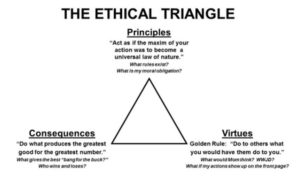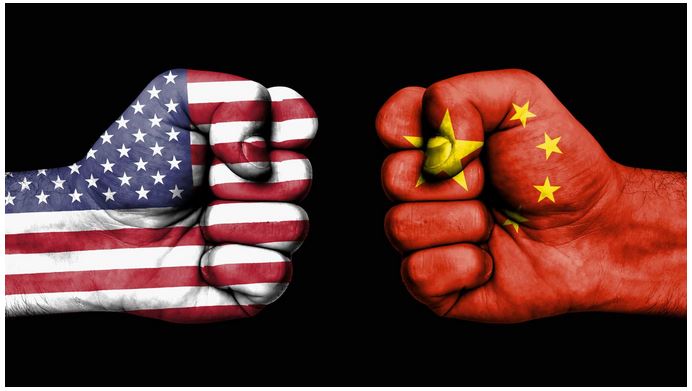Part of writing here at The Cognitive Warrior Project is having many different ideas for topics of conversation and sometimes these ideas collide. Before I even started this project, I had wanted to have an article or section on the ethics of a warfighter. That is still the goal and thanks to Twitter, I think that I have found a source. The Civil Affairs Association has a lot of articles and publications that you can choose from. All are relevant and provide a different perspective than what I think we normally read. I was reading one of their latest articles, Army Special Forces and Ethics By Timothy Lawn and could not stop thinking about the two very different approaches between the U.S. and China…it is hard for me to imagine the People’s Liberation Army (PLA) having a session on ethics. I have been mulling over the idea of another China article for a while and briefly touched on this topic in our discussion about adaptability. There exists two very different paths to victory in The New Great Game. Which are we going to choose?
In our discussion about Sean McFate’s book and presentation, The New Rules of War, we briefly touched on Rule Number Four: Hearts and Minds Don’t Matter of his 10 New Rules of War. In that chapter McFate harkens back to the 1st century Jewish insurgency that Rome crushed with ruthlessness and efficiency. Rome systematically killed or enslaved thousands, destroyed the temple in Jerusalem and induced a mass suicide of more than 900 because the fate of capture would be far worse. At the height of the counterinsurgency and the siege of Jerusalem they crucified up to 500 Jewish insurgents a day. Effectively, they ‘made a desert and called it peace.’ The had no insurgent problems for over 2 centuries.
For a more modern example McFate cites Sherman’s march to the sea through the south and his scorched earth policy that left little behind. For McFate, counterinsurgency must be strategically patient, determined and ruthless. Anything short of that will be doomed to fail. COIN is a fight for legitimacy and history tells us that it rarely works. For COIN to be successful it must be brutal and heartless. It works best when you employ 3 strategies:
- Drain the Swamp / Coercion (it is only genocide if you fail)
- Export and Relocate
- Import and Dilute
Most successful counterinsurgencies employ a combination of all three like the U.S. did to Native Americans and China did to Tibet. Which brings us to what China is doing today.
In the FRONTLINE episode titled China Undercover they discussed the current situation of the ethnic Uyghurs which are native to the Xinjiang Providence located in Northwest China. The Uyghurs are ethnic Muslims that like other Muslims in the greater region, experienced a rise in radical fundamentalism that lead to several terrorist attacks. In response to theses attacks, the Chinese have established ‘re-education camps’ and have imposed a virtual surveillance state in the province. In addition, they have also imported many ethnically Han Chinese to the area to dilute the population and have destroyed many of the mosques and cultural sites. The Chinese claim that all of the more than 2 million people that have been detained were all treated humanely and have since been released and the camps closed. But many have disappeared with no explanation as to where they are or if they are even alive.
According to the New York Times: The Xinjiang Papers: ‘Absolutely No Mercy’: Leaked Files Expose How China Organized Mass Detentions of Muslims and China Wants the World to Stay Silent on Muslim Camps. It’s Succeeding. The Chinese leadership:
distributed a classified directive advising local officials to corner returning students as soon as they arrived and keep them quiet. It included a chillingly bureaucratic guide for how to handle their anguished questions, beginning with the most obvious: Where is my family?
The Times story details the long struggle and the Chinese response:
Beijing has sought for decades to suppress Uighur resistance to Chinese rule in Xinjiang. The current crackdown began after a surge of antigovernment and anti-Chinese violence, including ethnic riots in 2009 in Urumqi, the regional capital, and a May 2014 attack on an outdoor market that killed 39 people just days before Mr. Xi convened a leadership conference in Beijing to set a new policy course for Xinjiang.
Since 2017, the authorities in Xinjiang have detained many hundreds of thousands of Uighurs, Kazakhs and other Muslims in internment camps. Inmates undergo months or years of indoctrination and interrogation aimed at transforming them into secular and loyal supporters of the party.
Why is the world not outraged by this? And what do the other ethnically Muslim countries have to say? Again, according the Times:
When Turkey’s leader, Recep Tayyip Erdogan, visited Beijing this summer, he hailed a new Silk Road bridging Asia and Europe. He welcomed big Chinese investments for his beleaguered economy. He gushed about China’s sovereignty.
But Mr. Erdogan, who has stridently promoted Islamic values in his overwhelmingly Muslim country, was largely silent on the incarceration of more than one million Turkic Muslims in China’s western region of Xinjiang, and the forced assimilation of millions more. It was an about-face from a decade ago, when he said the Uighurs there suffered from, “simply put, genocide” at the hands of the Chinese government.
Like Mr. Erdogan, the world has been noticeably quiet about Xinjiang, where China has built a vast network of detention camps and systematic surveillance over the past two years in a state-led operation to convert Uighurs into loyal, secular supporters of the Communist Party. Even when diplomats have witnessed the problems firsthand and privately condemned them, they have been reluctant to go public, unable to garner broad support or unwilling to risk financial ties with China.
Why? Again, the Times has you covered:
Backed by its diplomatic and economic might, China has largely succeeded in quashing criticism. Chinese officials have convinced countries to support Beijing publicly on the issue, most notably Muslim ones in Africa, Asia and the Middle East. They have played to the discord within the West over China. And they have waged an aggressive campaign to prevent discussion of Xinjiang at the United Nations.
If you can somehow justify these actions as response to terrorisms what about Hong Kong? Hong Kong has had a “special status” that has allowed a level of autonomy not experienced by the rest of China. Starting a little over a year ago, Hong Kong has been racked by protests which were in response to proposed Chinese legislation. Here is a short chronology of events:
February 2019 – Hong Kong’s Security Bureau proposes amendments to extradition laws that would allow extraditions to countries, including mainland China, beyond the 20 states with which Hong Kong already has treaties.
March 31 – Thousands take to the streets to protest against the proposed extradition bill.
April 3 – Hong Kong leader Carrie Lam’s government introduces amendments to the extradition laws that would allow criminal suspects to be sent to mainland China for trial.
April 28 – Tens of thousands of people march on the Legislative Council to demand the scrapping of the proposed amendments.
But that was a year ago, pre-coronavirus, how do things stand now? Reuters reports:
Having lost patience with Hong Kong’s failure to adopt national security legislation on its own, China announced on Thursday that it would directly enact laws to tackle secession, subversion, terrorism and foreign interference in the city.
The legislation, which the sources said remains subject to change, would also see both central and city government security agencies set up in Hong Kong, they said.
This legislation would end the special status that Honk Kong currently has. What does that mean? Again, from Reuters:
A revocation of the special status would cause problems for the more than 1,300 American companies with business operations in Hong Kong, including nearly every major U.S. financial firm. The State Department said 85,000 U.S. citizens lived in Hong Kong in 2018.
Some claim, that Hong Kong independence is the only way out. But what are the Chinese plans?
In the meantime, The Civil Affairs Association reports on Army Special Forces and Ethics in one of their latest articles.
According to the Department of the Army (2019), The Army Leadership and the Profession (ADP 6-22), ethics are an enduring set of beliefs, laws, and moral principles that guide and create an essential culture of trust within the Army profession. This culture of trust and expectations has its foundations nested within the Army leadership requirements attributes of “Be” and “Know.” These attributes are the development of character and honing the seven Army values; Loyalty, Duty, Respect, Selfless Service, Honor, Integrity, and Personal Courage, including the presence of military and professional bearing, and intellect. These requirements provide leaders with expectations that foster the development of skilled leadership, sharp mental-agility, and sound judgment, enabling Army leaders to prepare themselves for the dynamics of the unplanned. Finally, the Army leadership requirements model concludes with the “Do,” which are, leading others, developing self, and achieving results (Department of the Army, 2019).
The report continues:
The Army entrusts and deploys unsupervised, highly skilled special operations warriors as individuals or in teams to operate remotely and ensure mission success, often in extreme environments. ARSOF warriors have Americas and the Army’s faith and trust that they will conduct their mission with discipline, empathy, ethically, with humility, honorably, morally, and inspired with ARSOF’s core attributes, warrior creed, ethos, and SOF imperatives and truths (U.S. Army John F. Kennedy Special Warfare Center and School, 2015).
The report discusses the emotional intelligence required and framing the ethical dilemma in a way that is understandable in the new training which relies on the application of the Ethical Triangle.

Fig 1. The Ethical Triangle Obtained from: https://www.civilaffairsassoc.org/post/copy-of-army-special-forces-and-ethics
Obviously, ethical training is not the beginning or the end of our total strategy but that strategy will definitely be informed by policies like these. But, will this work? The difference between the two approaches are stark. The point of the post is not make light of the ethical training. The purpose is to highlight the extreme differences between the two approaches to similar problems. In the end, I do not know which path to victory will work, but I do know that the West does not have the collective will to employ such draconian and strict tactics in an attempt to achieve victory. I only hope that we have to fortitude to approach problems in an ethical manner. I believe that ethical approach is the much more difficult path.
The paper concludes with:
This paper evaluates ethical and moral reasoning through the lens of Army special operations forces. ARSOF analyzes ethical dilemmas and explores how they may define or structure problems, thereby allowing for the development of COA’s. Additionally, the paper explores the Army ethical triangle, which provides the opportunity to self-evaluate COAs. Through applying lessons learned in this paper, commands can construct a cost-effective model for assessment, training, and evaluation of emotional intelligence, ethics, and moral training, both classroom, and field. Only through a holistic and continuous career progression that increases in complexity and rigor can our warriors learn to overcome recent challenges and dilemmas. In conclusion, ARSOF must uphold honorable service to earn and maintain our Army’s and America’s trust.
Since the end of the cold war, U.S. foreign policy has been adrift without a clear adversary and lacked focus which has led to widespread criticism and backlash. Has China now emerged as that great adversary where we can stand as the light in contrast to their tyranny and darkness? The differences could not be greater and this is a battle that we must win.

